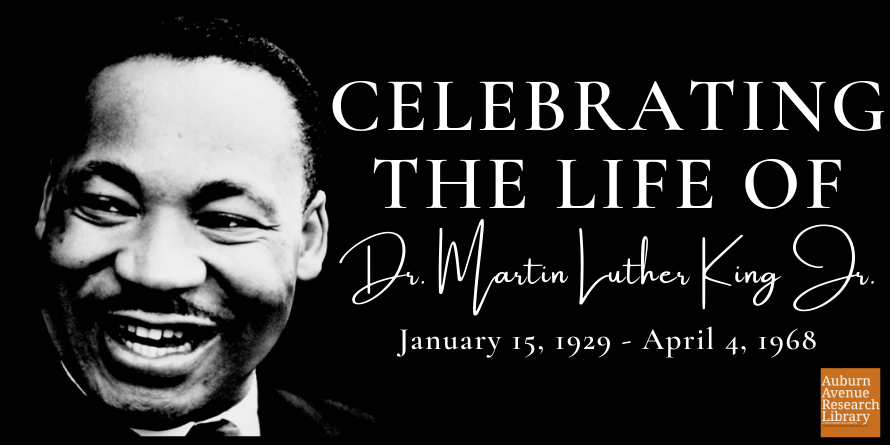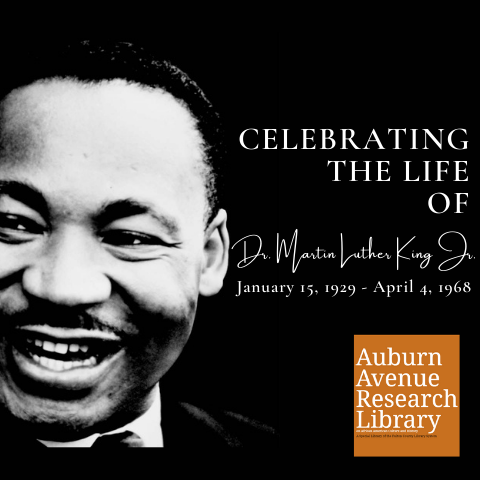AUBURN AVENUE RESEARCH LIBRARY
To help celebrate Dr. Martin Luther King, Jr.'s life and legacy on MLK Day 2021, the Auburn Avenue Research Library on African American Culture and History (AARL) has compiled notable archival collections at AARL, web resources to assist in learning more about Dr. King, videos of past programs related to Dr. King and his legacy, and age-appropriate reading lists compiled by the staff of the Auburn Avenue Research Library.
ABOUT MLK & MLK DAY
Dr. Martin Luther King, Jr. was an American Baptist minister and activist, who became the most visible spokesperson and leader during the civil rights movement until his assassination in 1968. The Atlanta native, Morehouse graduate, and Nobel Peace Prize recipient is known for his contributions to the American civil rights movement of the 1960s. His most famous work is his “I Have a Dream” (1963) speech, in which he spoke of his dream of a United States that is void of segregation and racism.
Each third Monday of January celebrates Martin Luther King Jr Day— this occasion is the only federal holiday designated as a national day of service. Readers around the globe explore the legacy, life, and history of the Atlanta native, and continue the pursuit of equality.
King led the 1955 Montgomery bus boycott and later became the first president of the Southern Christian Leadership Conference (SCLC). King helped organize the 1963 March on Washington, where he delivered his famous "I Have a Dream" speech on the steps of the Lincoln Memorial.
King was posthumously awarded the Presidential Medal of Freedom and the Congressional Gold Medal. King’s life is a true reflection of his commitment to peaceful protesting, equality, and social justice.
The King family has a long history in Atlanta and has greatly contributed to Atlanta communities and neighborhoods. Specifically, King lived and spent most of his childhood in the Sweet Auburn District. The King family has influenced multiple historic Black neighborhoods and communities around the country. Martin Luther King Sr. was the Senior Pastor of Ebenezer Baptist Church.
A graduate of Morehouse College, and a member of Alpha Phi Alpha Fraternity Inc., King Jr. is best known for advancing non-violent, civil rights through nonviolence and civil disobedience. King’s teachings were inspired by his Christian beliefs and Mahatma Gandhi’s nonviolent activism.
MLK Jr. Day is a great opportunity to jumpstart anyone’s research on the iconic leader. The campaign for a federal holiday in King's honor began soon after his assassination in 1968. President Ronald Reagan signed the holiday into law in 1983— first observed three years later and officially observed in all 50 states in 2000. Hundreds of streets in the U.S. have been renamed in King’s legacy and honor. The Martin Luther King Jr. Memorial on the National Mall in Washington, D.C., was dedicated in 2011.
MLK TIMELINE
- 1929 – Martin Luther King Jr. was born in Atlanta, GA on January 15, 1929. His original name was Michael King Jr. His parents were Alberta Williams King, opens a new window and Michael King Sr., opens a new window
- 1934 – Michael King Sr. traveled to Berlin as part of a multinational trip. While he was there he had a revelation, which led him to change his name to Martin Luther King Sr. He also decided to give Michael King Jr. the same name.
- 1935 – Befriended a Caucasian boy whose father had a business located across the street from the King household. Martin Jr. would receive his first lesson in racial hatred when the boy told him that they could no longer play together because the boy was “white” and Martin was “colored”. This was a painful lesson for the six-year-old Martin
- 1944 – Dr. King graduated from Booker T. Washington High School, opens a new window. Martin Jr. was only 15 at the time. In September of that year, he would begin his studies at Morehouse College, opens a new window.
- 1948 – 19 Year old Martin Luther King Jr. graduated from Morehouse College with honors.
- 1953 – On June 15th of this year, Martin Luther King Jr. married Ms. Coretta Scott, opens a new window. The wedding took place at the home of Coretta’s parents.
- 1954 – At the age of 25, King became the pastor of Dexter Avenue Baptist Church, opens a new window in Montgomery, Alabama.
- 1955 – King received his Ph.D. in Divinity from Boston University.
- 1955 – Led Alabama Bus Boycott. This event was influenced by two events that occurred that year. In March of 1955, a 15-year-old girl named Claudia Colvin refused to give up her seat to a Caucasian man leading to her arrest. On December 1st of that same year, Rosa Parks, opens a new window was arrested for refusing to give up her seat to a Caucasian man.
- 1957 - Prayer Pilgrimage for Freedom. This was the first event during which Dr. King addressed a public audience. During this event he delivered his Give Us the Ballot Speech, opens a new window. During this year, the Southern Christian Leadership Conference (SCLC), opens a new window was founded, and Dr. King would serve as its leader up until his death.
- 1959 – Dr. King moved back to Atlanta per request of the SCLC. He assumed the position of Assistant pastor of Ebenezer Baptist Church, opens a new window under his father.
- 1963 – The March on Washington. Dr. King delivered his famous I Have a Dream speech, opens a new window.
- 1964 – Won Nobel Peace Prize, opens a new window for combating racial inequality
- 1965 – Led three marches from Selma to Montgomery Alabama.
- 1967 – In opposition to the Vietnam War, Dr. King delivered his speech titled Beyond Vietnam, opens a new window.
- 1968 – March 28, Dr. King leads a protest in support of striking sanitation workers in Memphis, Tennessee.
- 1968 – April 3, Dr. King delivers his final speech titled I’ve Been to the Mountaintop, opens a new window.
- 1968 – April 4, Dr. King was shot and killed on the balcony of the Lorraine Motel in Memphis.

PROGRAMMING VIDEOS RELATED TO MLK
ASCENSION: THE UNTOLD FORMATIVE YEARS
OF DR. MARTIN LUTHER KING, JR.
This conversation with sex researcher and therapist, daughter of Atlanta civic and political leader, John Wesley Dobbs, and childhood friend of Dr. Martin Luther King, Jr, the late Dr. June Dobbs Butts will explore Dr. King's early formative years in Atlanta. This discussion was moderated by Georgia State University's Dr. Maurice Hobson, author of The Legend of the Black Mecca: Politics and Class in the Making of Modern Atlanta, opens a new window.
ONE DAY IN JANUARY WITH PHOTOGRAPHER HORACE HENRY
Photographer Horace Henry discusses his experience taking photographs at the first memorial services for Dr. Martin Luther King, Jr. Henry, a student from Clark Atlanta University, was plucked from the hundreds of people in the crowd outside of Ebenezer Baptist Church, and led to the "media pit" where he captured one of a kind photos of Coretta Scott King, Harry Belafonte, and others.
AFRICANA VIRTUAL STORY TIME:
MY DADDY, DR. MARTIN LUTHER KING, JR.
What was it like growing up as a son of Dr. Martin Luther King, Jr.? This picture book memoir, My Daddy, Dr. Martin Luther King, Jr. by Martin Luther King III, provides insight into one of history’s most fascinating families and into a special bond between father and son. This nonfiction picture book is an excellent choice to share during homeschooling, in particular for children ages 4 to 6. It’s a fun way to learn to read and as a supplement for activity books for children.
Africana Virtual Storytime presents the scope and breadth of AARL’s collection of illustrated Africana children’s literature - empowering educators, parents, and caregivers with the resources and skills to share stories of the diasporic Black experience with children.

MLK DAY READING LISTS
AARL MLK Day Reading List - Children's
Directors Blog - April 2025
AARL MLK Day Reading List - Teens
Directors Blog - April 2025
AARL MLK Day Reading List - Adults
Directors Blog - April 2025

MLK RELATED AARL ARCHIVAL COLLECTIONS
The Andrew J. Young Papers document his career and family life spanning more than 50 years, including his positions as a minister, civil rights activist, Congressman, Ambassador to the United Nations, Mayor of Atlanta, Co-Chair of the 1996 Atlanta Committee of the Olympic Games, and his involvement with Law Companies Group, Inc. and GoodWorks International.
The collection contains correspondence, speeches, press releases, calendars, books, minutes, reports, publications, articles, photographs, scrapbooks, artifacts, textiles, trophies and awards, artwork, posters, programs, campaign memorabilia, manuscripts, travel documents, notes, sermons, ephemera, and audio-visual material.
Minutes and agendas, scrapbooks, photographs, reports and historical writings, printed material and ephemera, personal papers, books, and artifacts are the elements of Reverend Williams Papers. The material documents the history and reflects the activities of Williams during the Civil Rights Movement, his political career, his business ventures, and the history of his involvement in several organizations including the SCLC. The collection also contains history and information on Hosea's Feed the Hungry and Homeless.
Also included are photographic materials that document the history and reflect the activities of Williams during the Civil Rights Movement, his political career, his business ventures, and the history of his involvement in several organizations including the SCLC.
This collection consists of four series: General Case Files; Civil Rights Cases; Photographs and Print Materials; Awards, Oversized Photographs, and Miscellaneous Prints; Ephemera; and Audio/Visual. The collection consists of 26 boxes. The General Case Files and Civil Rights Cases span the early 1950s to the late 1960s and include incoming and outgoing correspondence, legal motions, court transcripts, and other legal documents, as well as Hollowell’s notes related to the cases. The General Case Files consist mainly of divorces, wills, petty crime, and real estate transactions. The Civil Rights cases include school integration cases, wrongful termination suits, murder, and rape cases.
The photograph collection spans the late 1930s to c. 2005, and depict both Donald and Louise’s family life, as well as Hollowell’s legal career. The Awards collection consists of awards and honors Hollowell received over the years, as well as civil rights memorabilia. The Ephemera Collection includes academic regalia and Hollowell’s U.S. Army uniform, while the Audio-Visual collection consists of one video- a 2000 tribute to Hollowell.
MLK RELATED WEB RESOURCES
-
Auburn Avenue Research Library's Martin Luther King, Jr. Bibliography, opens a new window
-
Stanford University's Martin Luther King, Jr. Research and Education Institute, opens a new window
-
The King Center - The Center for Nonviolent Social Change, opens a new window
-
The National Civil Rights Museum at the Lorraine Motel, opens a new window
-
The National Center for Civil and Human Rights, opens a new window
-
Morehouse College's Dr. Martin Luther King, Jr. Collection, opens a new window
-
Dr. Martin Luther King Jr. National Historical Park, opens a new window







